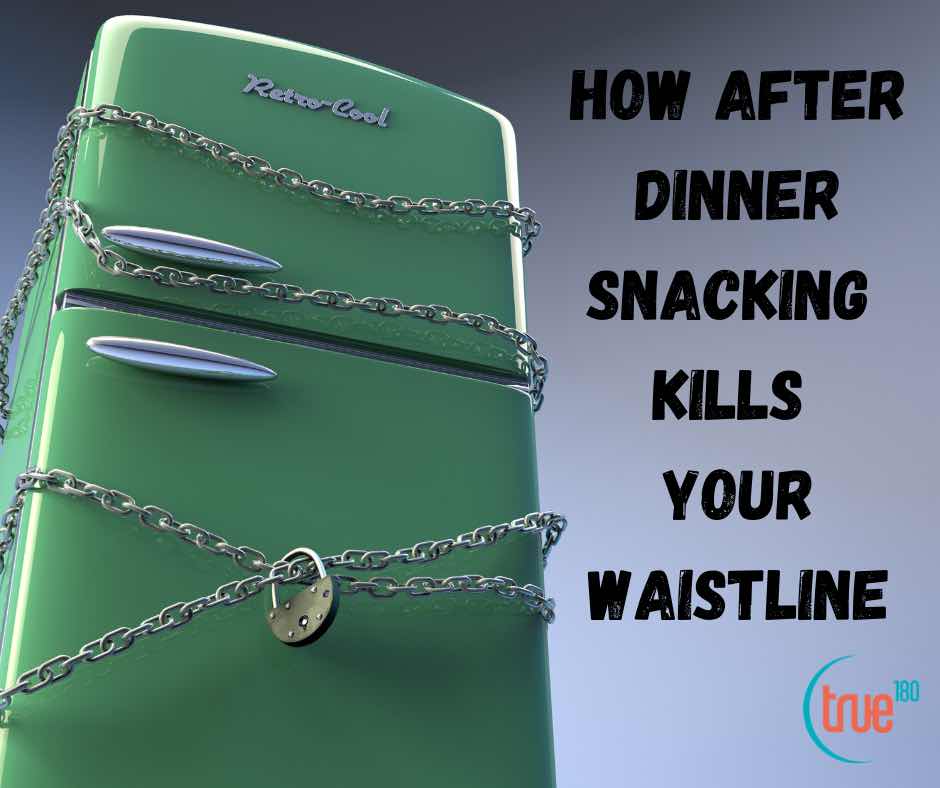How After Dinner Snacking Can Kill Your Waistline! The American obesity epidemic has been driven by snacking. The average American weighs 22 pounds more than they did in the late 1970’s. All of the extra calories that have led to American weight gain has come from snacking. Not some of the extra calories but ALL of them.
This means that anything you can do to manage snacking will be crucial in helping you reach or maintain a healthy weight. For most of our clients after dinner snacking is one of the biggest challenges.
Here are 6 powerful strategies:
#1. Removal: anything that consistently tempts you needs to go. If it’s in your house it’s in your mouth.
If the kids cheezits call your name 2 nights a week, then they’re not really the kid’s cheezits, they’re the family’s. Your health is always more important than anyone else’s indulgence or convenience.
If it is your husband’s ice cream stash that is the problem, then I would let him know that you need some help because you are struggling and that your life would be much better if he didn’t keep ice cream in the freezer. You might think it is not your place to ask for what you need, or have some other anxiety about asking. I understand that anxiety and I think that you’ve got a good chance of being pleasantly surprised with skillful asking. (more on how in #6.)
#2. Routine: the most consistently effective after dinner routine to signal “eating is over” is to brush your teeth. Most people associate this with going to bed, and most food doesn’t taste very good after brushing. Nothing is foolproof, but this is usually helpful.
#3. Avoidance: out of sight, out of mind and mouth. Staying out of the kitchen makes it much easier to focus on other things. When we see and smell food our brains begin anticipating and craving the eating of that food. Again, no one thing on this list is magic, however this will take the edge off and make success more likely.
If you have kids at home who rely on you for snacks, you likely know what they will ask for, so you can simply leave it out on the counter for them. And if they demand you fix them something else, this is a great opportunity to provide some vitamin N (No).
#4. Alternatives: calorie-free beverages (probably without caffeine), and sugar-free gum are great alternatives to after dinner snacking. It takes about 1 liter of liquid to make your stomach feel full, and that will help immensely. Chewing sugar free gum also gives your mouth something to do other than eating.
#5. Distraction: after dinner snacking is often, at least in part, something that we do to combat boredom. Modern 24/7 access to unlimited varieties of food is a form of entertainment, so some form of distracting entertainment can be extremely helpful. Here’s a list of the most common distractions from our clients: reading, TV, walking, phone calls, coloring books, craft hobbies (knitting, crocheting, etc.), puzzles, etc. Anything that is not eating is great.
#6. Social support: we are not islands. Even if you live alone it is crucial to have social support. When other people know about your problems they usually want to help. One challenge is that weight loss tends to be highly emotional – often a source of shame or embarrassment, and those feelings can make it hard to communicate in a way that will get you the support you need. When embarrassed we’re more likely to lash out, be vague or accuse others of holding us back, and these all build resentment. Being vulnerable (plainly sharing your feelings and struggles), and being clear (plainly asking for what you need) will go a long way.
Here’s an example of talking to another adult:
You: “Hey, I need to talk to you about a problem I’m having. I’ve been trying to lose weight and my after dinner snacking is killing me. I’m embarrassed to say that I don’t have enough self-control to say ‘no’ to the ice cream in the freezer. I know that you love having that ice cream in the freezer and that you can have it around without overeating it. I really wish that was true for me, but I just can’t. Can we please talk about some alternatives? What I need is for it to not be in the house. Would it be possible for you to go out for a single serve (or whatever you want) and not bring it home?”
[Aside: it’s important to note the use of “I” messages – we didn’t say, “you are making me fat because you keep your ice cream in the house, and I hate being fat…”. This will instantly put them on the defensive and likely hurt their feelings and prompt them to retaliate, or, at the least, be defensive and seek ways to make you wrong. Talking about my problems, my feelings and my struggles allows them to relax and listen.]
Them: One possible, unhelpful reply: “you don’t need to lose any weight…”
You: “I hear you saying that you like me the way I am and that you don’t want me to change. Thank you. That is so nice to hear. I also need you to know that I want to control my weight for me because it’s what I want and because of how it makes me feel. Does that make sense? I also need your help to feel my best… [then bring it back to your ask]”.
Getting a hold on snacking can really change your life. Everything is easier said than done and breaking it down into these 6 strategies can help you make it more manageable to change your lifestyle. All new things are difficult to do – in other words, expect to do these things poorly initially because that is how you learn to do them well.

